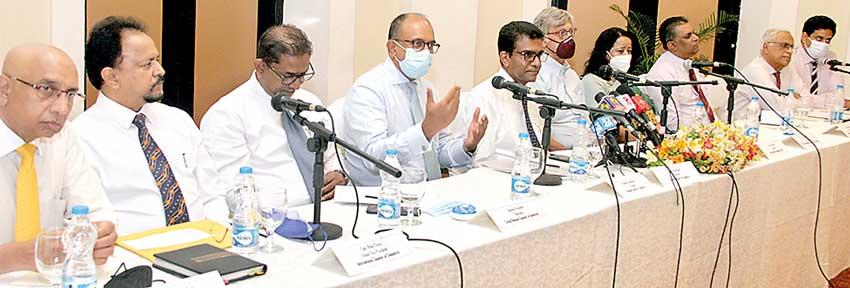08 Mar 2022 - {{hitsCtrl.values.hits}}

Joint chamber chiefs during the press briefing held at Taj Samudra Hotel, Colombo.
Pic by Pradeep Dilruckshana
By Nishel Fernando
As the on-going foreign exchange crisis has led to daily power cuts and fuel shortages threatening business continuity and crippling economic activity, Sri Lanka’s private sector yesterday demanded the government to take immediate action to address the worsening crisis by reforming the energy sector with market-driven pricing formulas, starting a preemptive foreign debt restructuring process and a reform programme backed by International Monetary Fund (IMF).
For the first time ever in the country’s history, 10 leading private sector business chambers yesterday came together united and held a joint press conference to reveal the gravity of current foreign exchange crisis on their industries, which employ 50 percent of the country’s workforce.
The 10 chambers included the Ceylon Chamber of Commerce (CCC), the Federation of Chambers of Commerce and Industry of Sri Lanka (FCCISL), Joint Apparel Association Forum Sri Lanka (JAAF), International Chamber of Commerce Sri Lanka (ICCSL), National Chamber of Commerce (NCC) of Sri Lanka, Exporters Association of Sri Lanka , Chamber of Construction Industry (CCI) of Sri Lanka, Ceylon National Chamber of Industries (CNCI), Women’s Chamber of Industry and Commerce (WCIC) and Chamber of Young Lankan Entrepreneurs (COYLE).
“Business activities are coming to a halt and the private sector is deeply concerned of consequences this would have in terms of business continuity that could reverse some of the gains seen recently in tourism and export sectors. The consequences of the forex shortage are also impacting the public causing severe hardship on a daily basis while disrupting the livelihoods of SMEs and daily wage workers,” the chambers warned.
They also demanded the government to establish market-driven pricing formulas for fuel, gas and electricity and simultaneously allowing flexibility on the exchange rate in order to assure continuous energy supply, supplies of other essential goods including medicine and export inputs.
“We are of the view that it is better to manage a situation of cost escalations compared to the present shortage of essential items including foreign exchange which is crippling economic activity,” the chambers stressed.
The Ceylon Chamber Chairman Vish Govindasamy noted that the current energy subsidies need to be removed in a manner that such subsidies reach targeted economically vulnerable groups.
While differing the Central Bank, he stressed that the increased expenditure on imports were mainly caused by rising cost of imports due to disruptions to global supply chains and not due to stockpiling. He also denied the allegation that the private sector continues to choose to import non-essential goods over essential items.
“All imports are restricted. The Letters of Credit (LCs) are opened only with the permission of the Central Bank” he added.
The chambers were of the opinion that the best way to direct scarce dollars towards essential imports is by immediately implementing a preemptive foreign debt restructuring process including both commercial and non-commercial debt.
“We feel that commencing this process will soon provide breathing space to allocate the scarce dollars towards essential imports such as fuel and medicines,” they said.
According to CNCI Chairman Canisius Fernando, around 20 percent of the manufacturing plants of the country are on the verge of collapse due to the current crisis as they struggle to source required imported raw materials.
Commenting on the construction sector CCI, CEO Nissanka N. Wijeratne noted that construction sector has seen as much as 50,000 job losses due to the current crisis, which has brought the entire sector to a standstill.
According to NCC President Nandika Buddihapla, SMEs are the hardest-hit by the current crisis as they mostly rely on credit facilities to source imported raw materials.
Meanwhile, the chambers also urged the government to pursue the support of the IMF and formulate a reform programme that would provide confidence to the market and private sector with immediate effect.
Responding to media queries, Govindasamy noted that private sector is prepared for the fiscal consolidation measures through tax increases recommended by the IMF.
“The private sector, as represented by the joint chambers, is ready to support the government in developing and implementing a programme that would help Sri Lanka emerge out of this crisis and stage a strong post-pandemic recovery as envisioned by all stakeholders. We are willing to engage with relevant authorities and policymakers to deliberate this further and take swift action,” the chambers said in unison.
15 Nov 2024 4 hours ago
15 Nov 2024 5 hours ago
15 Nov 2024 6 hours ago
15 Nov 2024 6 hours ago
15 Nov 2024 7 hours ago